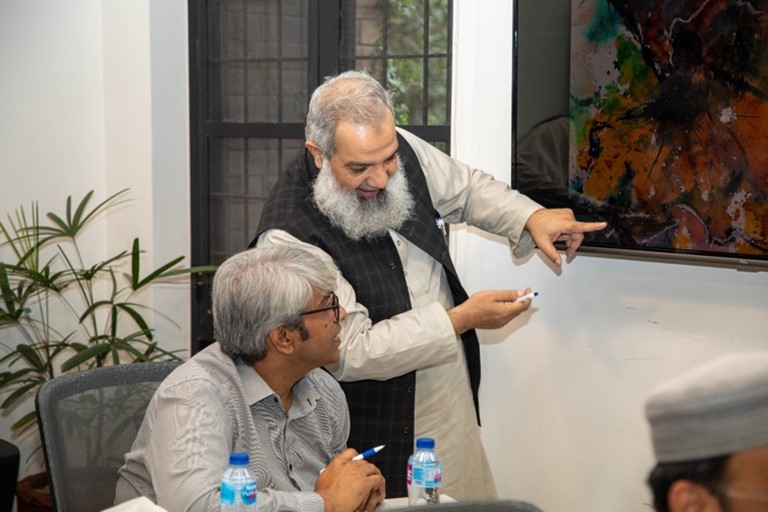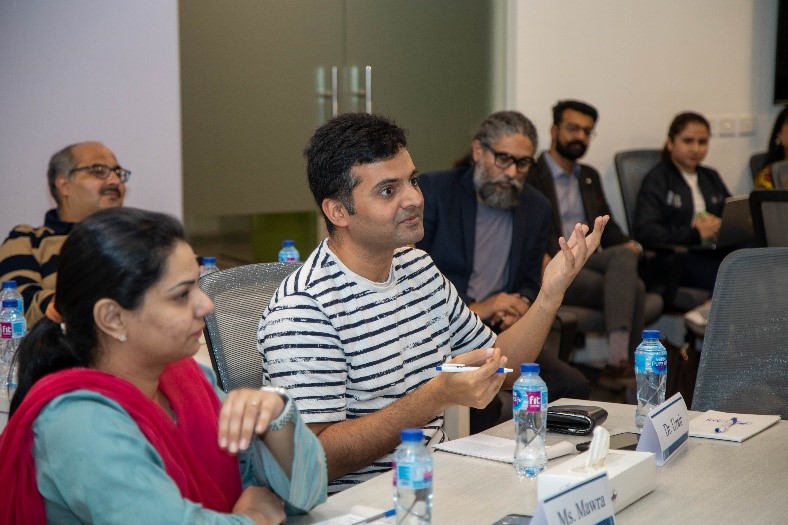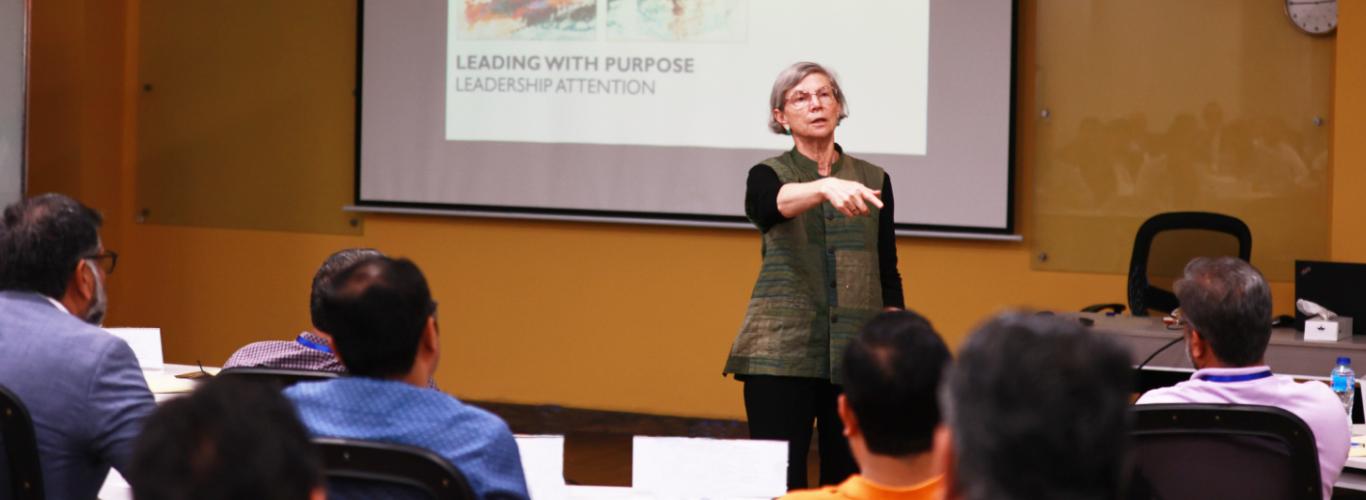Visualising Leadership
The lecture begins with participants, in this case faculty and senior leaders at LUMS who were invited to reflect on one of Professor Adler’s paintings for three minutes. Engrossed with what would come next, Dr. Nancy J. Adler, Professor Emerita of Organisational Behaviour, and Samuel Bronfman Chair Emerita in Management at McGill University facilitated the critical conversations that followed.
Walking across the discussion room at the LUMS Learning Institute, Dr. Adler captivated the audience by offering unique insights about the qualities effective leaders exhibit.
“There’s empirical evidence that extraordinary leaders exhibit at least three behaviours” summarised Dr. Adler, who is known as a top researcher and consultant on global leadership, cross-cultural management, and infusing the arts into every facet of her work. A member of LUMS’ University Advisory Board, she accepted Vice Chancellor, Dr. Arshad Ahmad’s request to conduct two sessions, one for faculty at LUMS and another for senior corporate managers.
Some of the most important qualities of an effective leader were summarized as follows. First, successful leaders are hyper focused on purpose, whatever their specific purpose might be. Second, they constantly reflect on their performance and that of the organisation they are leading by listening to their inner voice. Doing so takes them to new thresholds for action. And finally, the best leaders support those junior to them so that they surpass their mentors. Dr. Adler said, “If your actions inspire others to learn more and to contribute more, then you are the type of leader we need most in the 21st century”.
With multiple roles to play, from advising students to conducting breakthrough research, faculty members at LUMS, can benefit from a focused leadership approach that helps them to optimise their time.


Dr. Irfan Moeen Khan, Assistant Professor from the Gurmani School remarked, “Visualising our present challenges and then shifting our focus to times when we achieved success in the past to rethink the problems was really helpful. This was the best part. I also loved meditating on the painting. Thanks to Dr. Nancy, while consulting with my partner at the table, I walked away from the discussion with tangible actions to deal with an issue that has vexed me since I joined LUMS”.
“LUMS is a world leader in learning without borders - bringing together disciplines and drawing strength from promoting diversity and inclusiveness which is personified in the National Outreach Program” noted Dr. Adler. She added, “If one looks at extraordinary leaders across domains, it is people who bring meaningful change. Leaders know who they are and are great at leveraging what they’re good at and delegating the rest.”
She further emphasised that it is critically important to know what we, as leaders, should give our attention to and then to develop more effective ways of achieving success. Motivating participants to look for examples of what deserves the highest quality of their attention at LUMS, Dr. Adler described the importance of introspection. “The best leaders are always driven by purpose. What is your leadership style? What are the qualities that makes you a good leader?” she asked.
In a longer, 4.5-hour session co-taught by Dr. Adler, and Dr. Ahmad, LUMS VC at the Rausing Executive Development Centre’s Management Development Programme, 36 senior managers were similarly engaged.
Dr. Ahmad shared insights by contrasting leaders who move from a fixed to a growth mindset – one that is curious, inquisitive, willing to learn from mistakes, which finds value in criticism. “As leaders, we should be open to go through sudden and steep stages to not only learn, but also to unlearn and relearn.” He added, “the literature on expertise teaches us that as novices, we expect and demand right and wrong answers. As our own beliefs in learning shift from evidence we are open to accept, we experience relative thinking, weighing alternatives until we feel comfortable to take a position, and defend it”. Using Bloom’s taxonomy that is commonplace in training teachers, ultimately, the leader also ascends a hierarchy of thinking –from knowledge, analysis, application, evaluation, and synthesis – to creativity.
Both Dr. Adler and Dr. Ahmad shared examples of extraordinary leaders with a purpose who bring frame-breaking changes that improve systems. They take more organisational risks, and so, can fail more often than those who don’t. But even though they take risks, and fail more often, they rarely if ever make the same mistakes twice. Why? Because they are extremely good at learning, from both their successes and failures. This is why reflection is so important and supports extraordinary leadership. Reflection is key to learning.”
The participants in both the sessions were also introduced to ‘appreciative inquiry,’ a model that brings about organizational and societal change by leveraging ‘the best of the best’ – by focusing on ‘the positive’. Dr. Adler explained that with appreciative enquiry leaders start by identifying what’s working best, and then analyze how to multiply those moments of peak performance. . She described how effective leaders cultivate a habit of reflecting on how to produce peak performance. Keeping a risk journal documenting how you, as a leader, respond when asked to take risks, is a part of that process.
Leaving the participants, ‘all leaders in their own circles’, with a lot to think about, Dr. Adler added, “People who have the highest impact know who they are, they do what they love doing, and they address what to them are the world’s greatest needs!”























